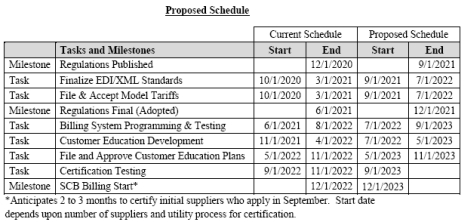|
|
|
|
|
PSC Staff Seeks Delay In Date For Supplier Consolidated Billing Implementation, As Milestones Pass Without Consensus
The following story is brought free of charge to readers by EC Infosystems, the exclusive EDI provider of EnergyChoiceMatters.com
Staff of the Maryland PSC have filed a request to revise the schedule for implementation of supplier consolidated billing, and to employ a consultant to assist with implementation
"The SCB implementation schedule, as approved by the Commission, should be revised, as certain milestones dates have passed and there remains a lack of consensus," Staff said
Staff proposed a revised schedule (below) that would delay the implementation of SCB by twelve months to December of 2023 instead of the end of 2022.
"Among the individual changes, Staff added three months to the EDI/XML standard development schedule to allow two additional months to procure the consultant. Under the proposed schedule, utilities and retail suppliers would begin programming systems in July of 2022. SCB would begin testing with retail suppliers in September of 2023. Subject to the amount of time it would take to test the suppliers, which Staff estimates to take two to three months; the initial batch of SCB suppliers could send bills in December of 2023 as proposed," Staff said
Staff said that an SCB working group has not reached a consensus on the proposed schedule.
Staff reported that, "Exelon informed Staff, in a response to discovery, that the Companies believe they should delay the implementation of SCB for about two years until September of 2025. The Exelon Companies explained that BGE and PHI have planned billing systems upgrades, in PHI’s case impacting multiple jurisdictions, which should preclude the development of SCB functions until the system IT projects have been completed."
Staff stated, "Staff expects to reply to Exelon’s proposal in more detail once the proposal is made to the Commission, but Staff does not view the request favorably. In particular, it is difficult for Staff to determine if the IT choices made by the Company were discretionary, especially since the SCB development schedule has been established since 2019."
Staff's proposed SCB schedule is:
Staff also recommended that a consultant be retained to assist with SCB implementation for electricity, due to the use of EDI
"After discussions with the utilities, petitioners, and other suppliers, Staff acknowledges that technical expertise outside of Staff’s core capabilities is required to draft the required EDI documentation and coordinate submission of proposals to change the statewide EDI standards. It is Staff’s understanding that parties generally support the use of an outside EDI expert to assist the EDI technical working group with drafting change controls and to oversee the work necessary to develop the EDI standards for SCB. The EDI standards used in retail choice transactions between retail suppliers and utilities describe specific data exchange requirements allowing consistent and error free exchange of billing, enrollment, metering, and payment information. Currently Maryland’s EDI standards are maintained as part of a uniform set of protocols used in several PJM states. When EDI transactions for the State of Maryland were developed to implement retail choice programs, a technical consultant assisted with the development. Parties agree, Staff included, that the EDI development process would be more efficient if a technical consultant were hired to oversee the drafting of standards to implement SCB," Staff said
"Parties, with the exception of the Exelon Utilities, generally agree that a technical consultant is not necessary for the gas XML technical working group. The XML documentation used by BGE and WGL in Maryland are not coordinated with other jurisdictions in a formal manner, so adoption of XML based standards could be accomplished solely with agreement among BGE, WGL and participating retail gas suppliers. Additionally, when XML transactions have been developed in the past, the technical experts from suppliers and the utilities collaborated with Staff in a manner that did not require an outside work group leader to develop and guide technical documentation. Staff was able to act as of a facilitator of the previous development process. WGL agrees that a consultant is not necessary for XML; and believes that, if a consultant is needed, the consultant should be neutral and not on contract by another interested utility, i.e., working on a project to create the utility’s related SCB functions. The Exelon Utilities believe that there is value in having a neutral coordinator that has the technical background and understanding of SCB-related XML implementations in other jurisdictions to help expedite the process," Staff said
Staff reported that, "The Exelon Utilities have offered to procure a consultant to assist with the EDI and XML working group(s) but would like assurances that they will receive cost recovery for the consultant."
"To this end, Exelon has asked to recover the cost of the consultant through discount rates applied to retail choice billings in the manner that funds costs associated with utility consolidated billing ('UCB') purchase of receivables ('POR')," Staff said
However, Staff said that, "Staff recommends that the Exelon Utilities should be permitted to seek cost recovery of the consultant as part of a review of all other costs associated with implementing SCB."
"Recovery through the UCB POR mechanism may not be appropriate because not all UCB suppliers may choose to participate in SCB. The establishment of a regulatory asset to facilitate the future recovery of procurement costs for a technical expert may be a reasonable alternative to UCB recovery. Staff supports allowing each utility to establish an asset for costs associated with EDI development as needed to recover consultant costs," Staff said
"Staff recommends that the scope of the consultant be limited to EDI development as XML development has been addressed in the past with internal utility and supplier resources. Further, EDI expertise is likely to be more available from consultants specific to the EDI field. Requiring a combined XML and EDI scope may limit the availability of available experts and possibly increase costs," Staff said
"Staff recommends the Commission permit Exelon to procure the consultant for EDI and defer cost recovery of the consultant costs along with the other SCB-related costs," Staff said
Case No. 9461
ADVERTISEMENT Copyright 2010-21 Energy Choice Matters. If you wish to share this story, please
email or post the website link; unauthorized copying, retransmission, or republication
prohibited.
Staff Seeks To Retain Consultant For SCB Implementation, Utility Seeks To Recover Consultant Costs In UCB POR Discount
September 24, 2021
Email This Story
Copyright 2010-21 EnergyChoiceMatters.com
Reporting by Paul Ring • ring@energychoicematters.com

NEW Jobs on RetailEnergyJobs.com:
• NEW! -- Power Analyst
• NEW! -- Financial Analyst
• NEW! -- Environmental Commodity Analyst
• NEW! -- Gas Analyst
• Energy Pricing Analyst -- Retail Supplier
• Senior Account Operations Analyst -- Retail Supplier
• Energy Procurement Manager
|
|
|
|









